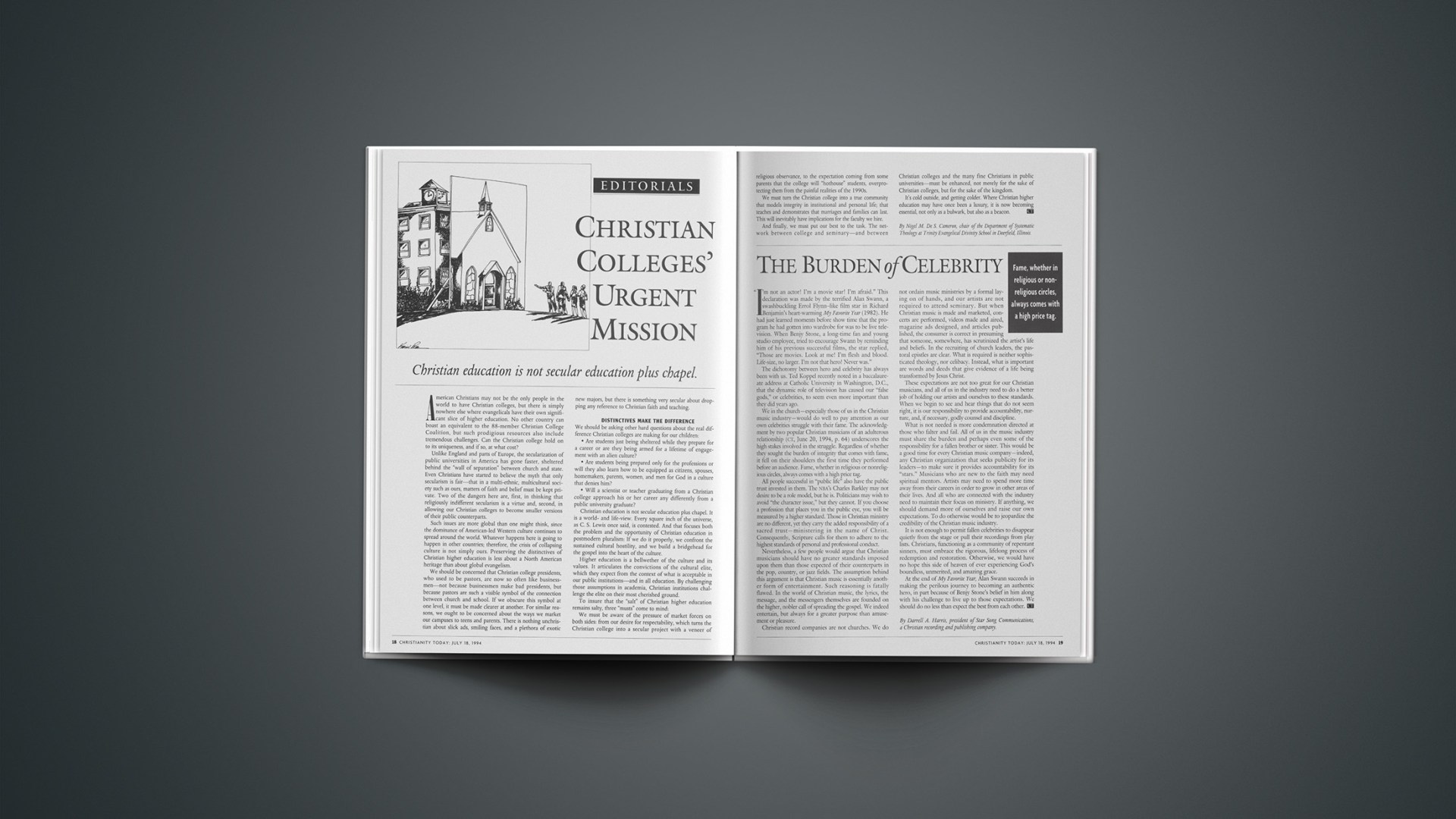American Christians may not be the only people in the world to have Christian colleges, but there is simply nowhere else where evangelicals have their own significant slice of higher education. No other country can boast an equivalent to the 88-member Christian College Coalition, but such prodigious resources also include tremendous challenges. Can the Christian college hold on to its uniqueness, and if so, at what cost?
Unlike England and parts of Europe, the secularization of public universities in America has gone faster, sheltered behind the “wall of separation” between church and state. Even Christians have started to believe the myth that only secularism is fairthat in a multi-ethnic, multicultural society such as ours, matters of faith and belief must be kept private. Two of the dangers here are, first, in thinking that religiously indifferent secularism is a virtue and, second, in allowing our Christian colleges to become smaller versions of their public counterparts.
Such issues are more global than one might think, since the dominance of American-led Western culture continues to spread around the world. Whatever happens here is going to happen in other countries; therefore, the crisis of collapsing culture is not simply ours. Preserving the distinctives of Christian higher education is less about a North American heritage than about global evangelism.
We should be concerned that Christian college presidents, who used to be pastors, are now so often like businessmennot because businessmen make bad presidents, but because pastors are such a visible symbol of the connection between church and school. If we obscure this symbol at one level, it must be made clearer at another. For similar reasons, we ought to be concerned about the ways we market our campuses to teens and parents. There is nothing unchristian about slick ads, smiling faces, and a plethora of exotic new majors, but there is something very secular about dropping any reference to Christian faith and teaching.
DISTINCTIVES MAKE THE DIFFERENCE
We should be asking other hard questions about the real difference Christian colleges are making for our children:
* Are students just being sheltered while they prepare for a career or are they being armed for a lifetime of engagement with an alien culture?
* Are students being prepared only for the professions or will they also learn how to be equipped as citizens, spouses, homemakers, parents, women, and men for God in a culture that denies him?
* Will a scientist or teacher graduating from a Christian college approach his or her career any differently from a public university graduate?
Christian education is not secular education plus chapel. It is a world- and life-view. Every square inch of the universe, as C. S. Lewis once said, is contested. And that focuses both the problem and the opportunity of Christian education in postmodern pluralism. If we do it properly, we confront the sustained cultural hostility, and we build a bridgehead for the gospel into the heart of the culture.
Higher education is a bellwether of the culture and its values. It articulates the convictions of the cultural elite, which they expect from the context of what is acceptable in our public institutionsand in all education. By challenging those assumptions in academia, Christian institutions challenge the elite on their most cherished ground.
To insure that the “salt” of Christian higher education remains salty, three “musts” come to mind:
We must be aware of the pressure of market forces on both sides: from our desire for respectability, which turns the Christian college into a secular project with a veneer of religious observance, to the expectation coming from some parents that the college will “hothouse” students, overprotecting them from the painful realities of the 1990s.
We must turn the Christian college into a true community that models integrity in institutional and personal life; that teaches and demonstrates that marriages and families can last. This will inevitably have implications for the faculty we hire.
And finally, we must put our best to the task. The network between college and seminaryand between Christian colleges and the many fine Christians in public universitiesmust be enhanced, not merely for the sake of Christian colleges, but for the sake of the kingdom.
It’s cold outside, and getting colder. Where Christian higher education may have once been a luxury, it is now becoming essential, not only as a bulwark, but also as a beacon. t
*************************
Nigel M. De S. Cameron is chair of the Department of Systematic Theology at Trinity Evangelical Divinity School in Deerfield, Illinois
Copyright © 1994 Christianity Today. Click for reprint information.
ctjul94mrw4T80185619










